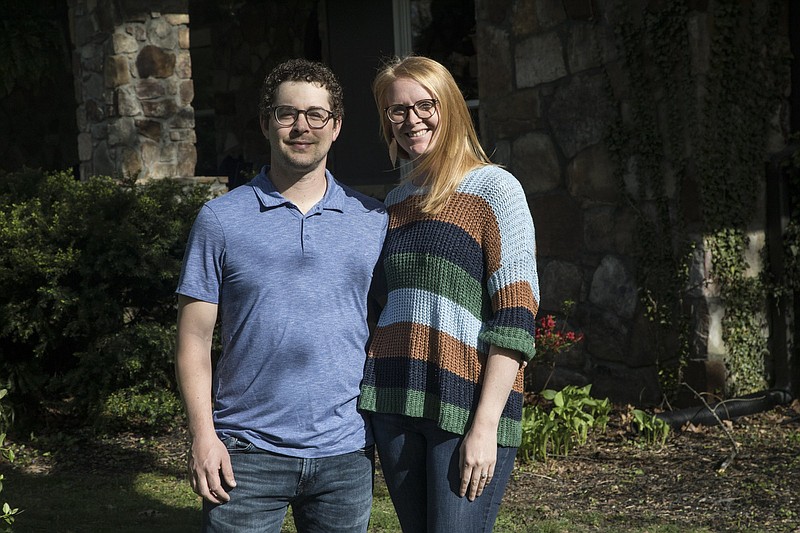What happens to children in state custody when the rest of Tennessee's residents are staying home to prevent spread of the coronavirus?
Chambliss Center for Children's Residential Program, which serves children who have been removed from their homes because of abuse, neglect, abandonment or delinquency, is adapting its operations to continue providing support to its foster families as well as young adults in its transitional living facilities during the pandemic.
The biggest change for the agency has been the switch from in-person to virtual visits with its foster families, said Liz Blasbery, Chambliss Center for Children's director of residential services.
When Chambliss places a child in a foster home, a caseworker normally visits the home once within the first 24 hours and three additional times within the first month. Those visits are now conducted virtually through apps such as Zoom and FaceTime, with workers doing separate video chats with the parents and the child, Blasbery said.
Children are still required to get a full medical checkup at the Hamilton County Health Department within the first 72 hours of placement, she said.
The agency is only placing children with its current foster families, as it is not able to open new foster homes at this time. But those who are interested in becoming foster parents can now take most of the six-week class they are required to take online, which the state recently authorized for the first time.
Chambliss is checking regularly with its foster families to ensure they have adequate supplies of food and other necessities, as most do not have enough income to stock up on those items, Blasbery said. Every Friday, the agency draws a name of one of its foster families to send dinner through a service such as Dinner Delivered "just to say, 'Hey, we're thinking about you,'" she said.
"Being a parent in general is a challenge, but there are additional challenges to being a foster parent," said Shannon Connolly, who with her husband fosters three children, ages 6, 7 and 17.
She never planned or wanted to be a teacher but, like other parents during the pandemic, she is now homeschooling her children while also working a full-time job from home.
Her 17-year-old, a high school sophomore, has assignments he can work on, but her younger children require a more hands-on approach. Their kindergarten and first-grade schoolwork would be better described as "resources" than "assignments," she said.
"That part is the most stressful, because I can't just say, 'Go read this,'" she said.
But the sophomore, who just moved in three months ago, needs some oversight as well.
"He hasn't been held accountable for homework in the past, so [working with him] has almost been as hands-on as the little kids," Connolly said.
The sophomore is at the age when one most wants to be away from parents, but he was just getting established at his new school and has few social outlets.
"It's a tough year for him in general, but this makes everything more challenging for him," she said.
Like many children in the foster system, her younger kids are behind in school. Her first grader's Individualized Education Program at school provides additional support in speech and language therapy that Connolly cannot provide, and she's concerned the child will fall further behind as a result.
Children who have been through trauma also tend to have a more difficult time in situations without structure, she said.
"Our youngest thrives on routine, so this really threw her for a loop," Connolly said. "She needs a schedule to feel safe, and we try the best we can to implement a schedule every day, but with my husband and I both working, that's not always possible."
Before the courts shut down due to the pandemic, the Connollys were in the midst of the termination process for legal custody rights with the parents of their youngest children, who are siblings. Their hearing that was originally scheduled for April has been postponed until June.
"Kids deserve permanency and a stable life," Connolly said. "We're hopeful that sometime this year we'll be able to give [our youngest children] permanency."
YOUNG ADULTS
Chambliss' transitional living program, which provides one-bedroom apartments at no cost to young adults ages 18-21 who are transitioning out of foster care, still has 11 residents living on-site and has six more ready to move in.
The isolation of quarantine is particularly difficult for the young adult age group, said Blasbery, which the agency tried to combat around the start of the pandemic by throwing outdoor pizza parties with attendees maintaining a social distance of 6 feet. When Gov. Bill Lee banned gatherings of more than 10 people, Chambliss encouraged residents to socialize virtually through apps such as Houseparty.
Residents receive a stipend for groceries and a bus pass, and they are typically required to hold part-time jobs in addition to attending school full time. The job requirement is being waived during the pandemic, and the agency is offering ride-sharing services to residents without cars so they can avoid the increased chance of exposure to the virus that comes with riding the bus.
The state is continuing to pay for residents' school, and the goal is to continue meeting their basic needs so they can earn a degree and graduate without any debt, said Blasbury.
Contact Emily Crisman at ecrisman@timesfreepress.com or 423-757-6508.
